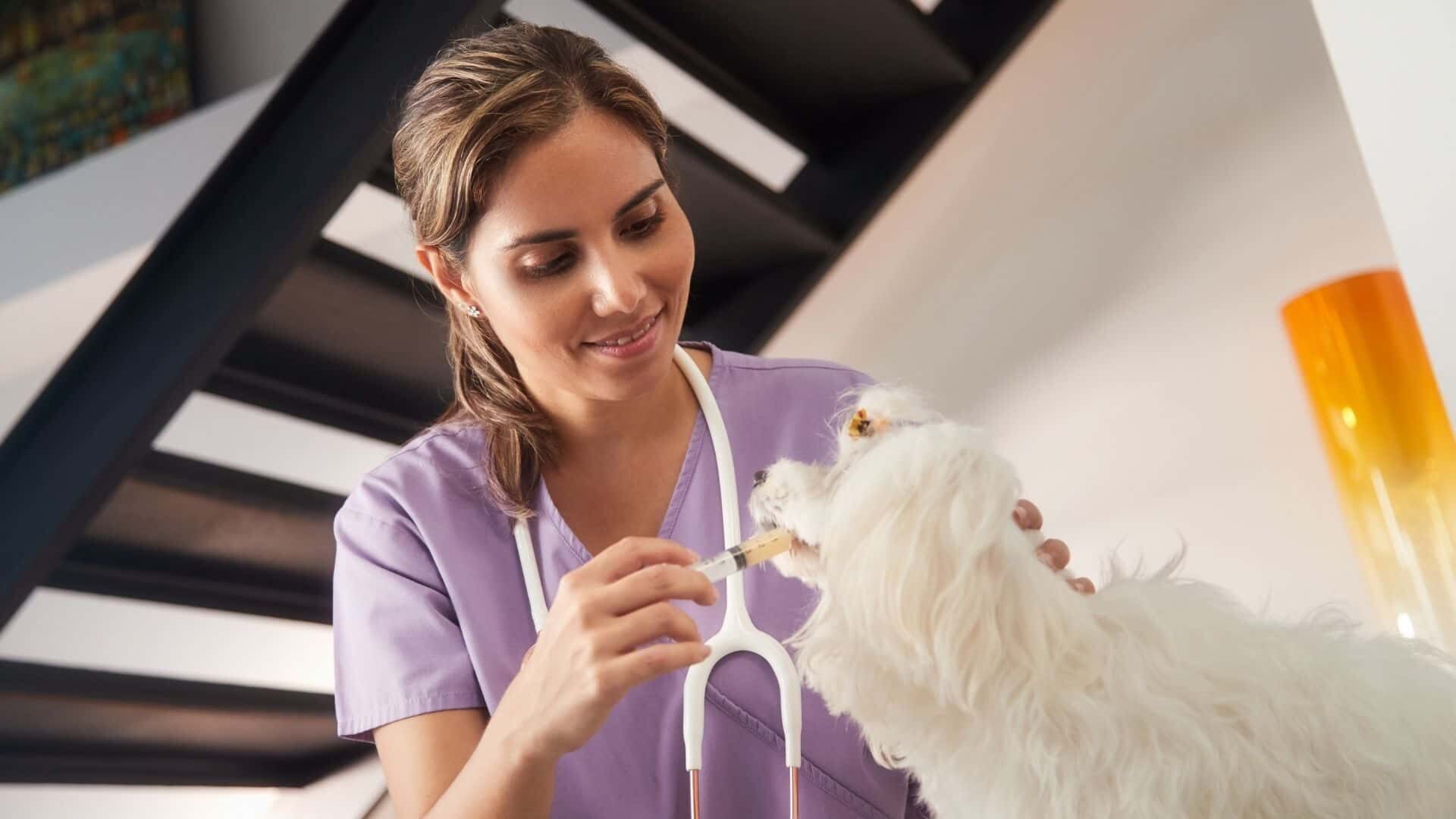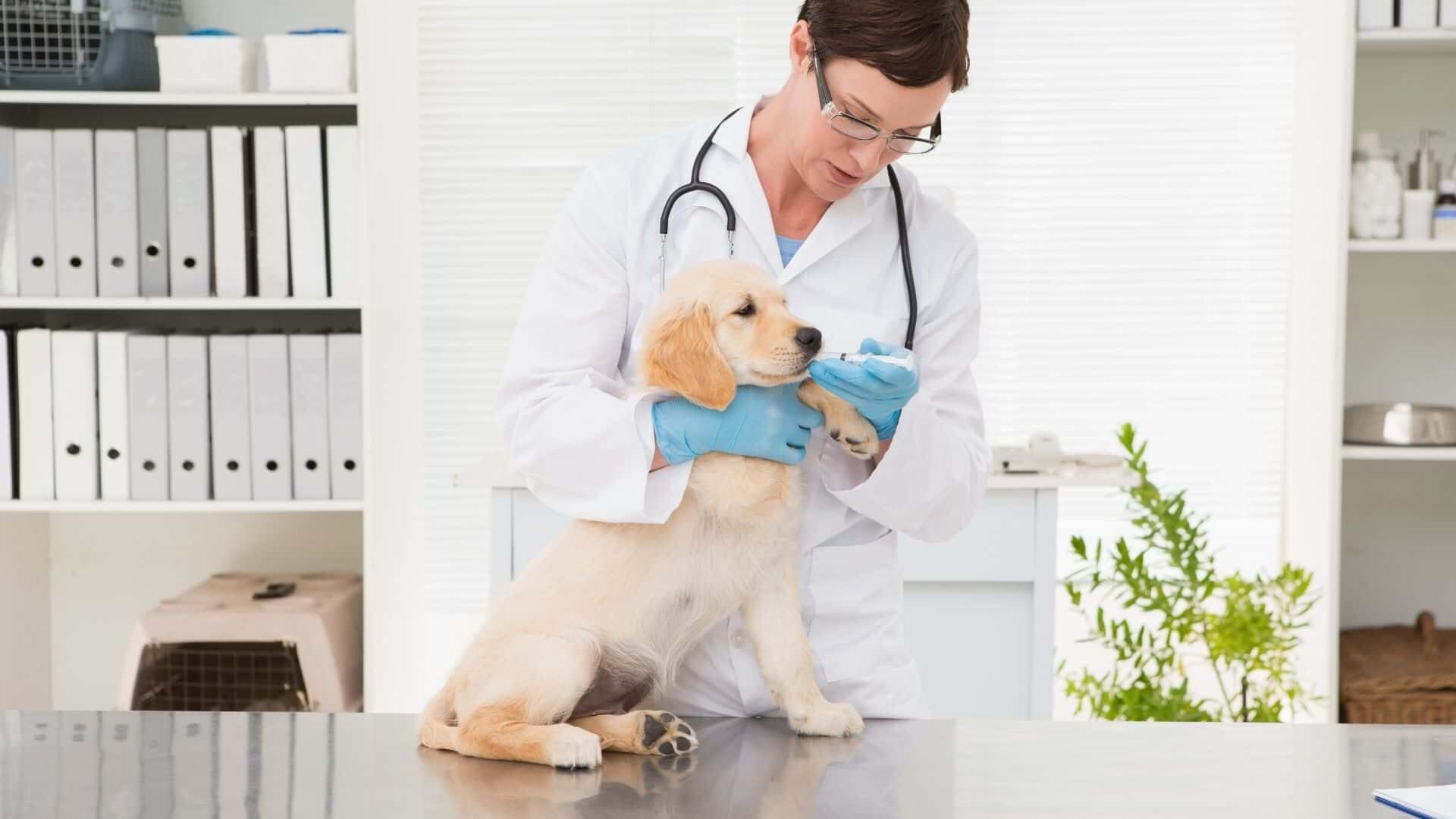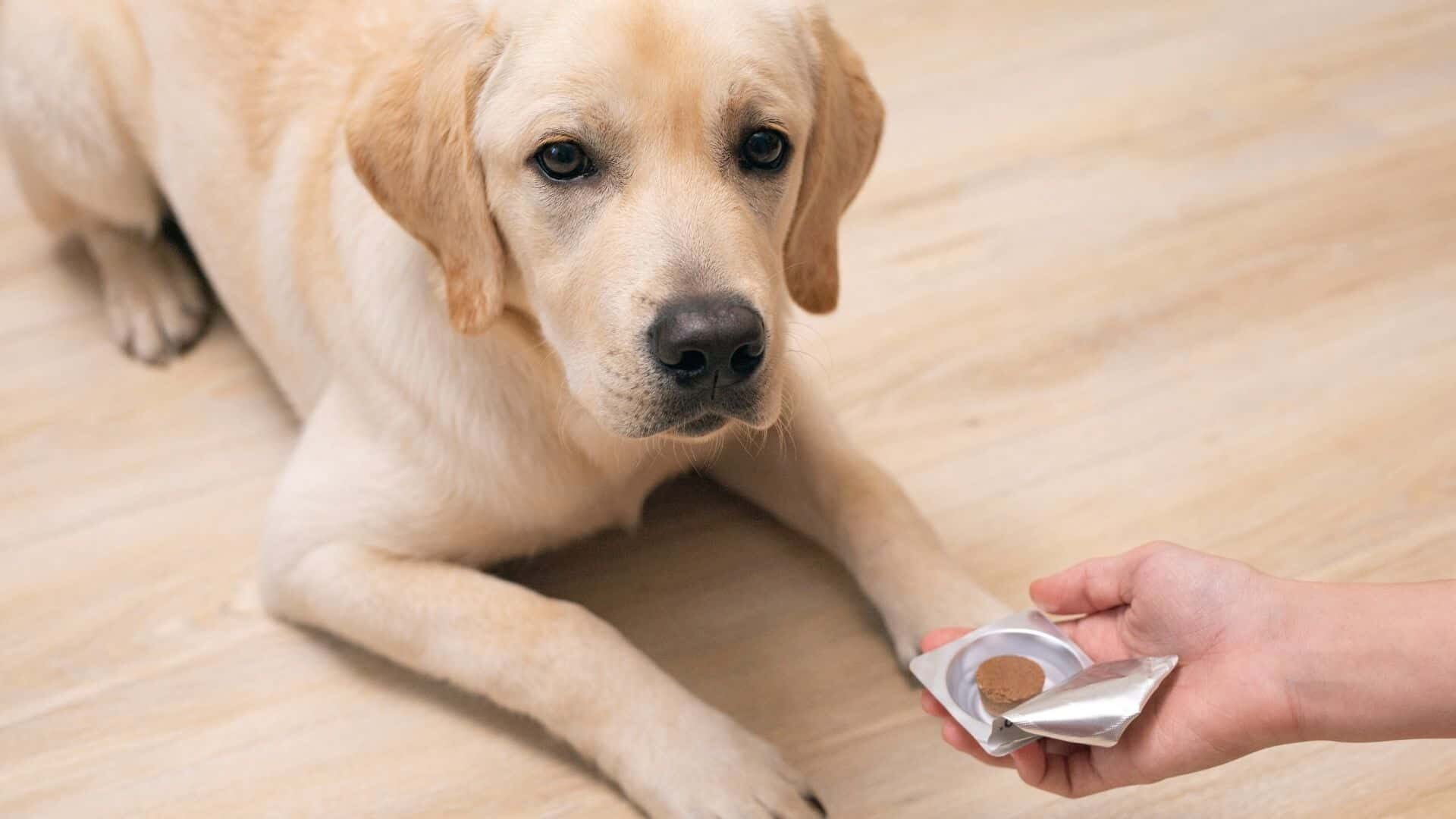When it comes to canines, stomach upset, or dyspepsia, is the most common ailment. Dogs of all ages can be affected by it, and in most cases, they will recover on their own. Gut problems can be more than just an upset stomach, and they may be linked to a more serious condition.
If your pet is experiencing severe gastrointestinal symptoms that persist for more than a reasonable 24-hour period, you should contact your veterinarian as soon as possible, regardless of the cause. Symptoms such as anemia, dehydration, and weight loss can develop if an upset stomach persists for longer than the recommended 24-hour period. Dehydration and severe anemia have the potential to be fatal.
When you’re feeling a little under the weather, you’ll probably reach for a bottle of ginger ale or some crackers. If your dog’s stomach is upset, what should you do?
Discover the causes and symptoms of a dog’s upset stomach, as well as some home remedies that can help your pup feel better.
What causes upset stomach in dogs?

Dogs’ stomach problems can have a variety of causes. A sudden change in appetite, overeating, or simply not eating enough could be some of the more benign triggers. An upset stomach in either situation can lead to illness in a pup. To help you better understand why dogs get sick, I’ve listed a few common culprits.
1. Parasites
Any of a number of parasites, such as giardia or any of the aforementioned can cause diarrhea in dogs. giardia and coccidia are two of the more common ones on this list.
There are a variety of ways that these microscopic parasites can harm your dog, from simple irritation to potentially life-threatening issues if they are not taken care of.
2. Viruses
Gastroenteritis is also caused by viruses, including deadly ones like distemper and parvo. You need to get in touch with your vet immediately if either of these conditions is suspected.
Bacterial infections, which can cause gastrointestinal upset in pets with weakened immune systems, are a possibility. Salmonella and E. coli are two of the most common bacteria in the food supply. A vet will be needed to determine if a chronic condition, such as colitis in dogs, is to blame for the problem.
3. Change the food your dog eats
When it comes to food, dogs are willing to eat almost anything you put in front of them, but their stomachs don’t always agree. A change in diet is one of the most common causes of an upset stomach. A simple change in brand or flavor of dog food can wreak havoc on a dog’s gastrointestinal tract. The digestive system needs time to adapt to diet changes, so making the transition too quickly can result in discomfort.
So, to give yourself some breathing room, keep a supply of your dog’s current food on hand. For about a week, gradually increase the amount of new food you eat while decreasing the amount of old food you eat until the transition is complete.
4. Food Intolerance
Dogs are not allowed to eat certain foods that are perfectly safe for humans to eat. Ingesting seemingly harmless foods like chocolate, grapes and garlic can make a dog ill. Dogs that consume large quantities of these can be especially dangerous. Xylitol, a common artificial sweetener, is extremely toxic to animals and should be kept out of reach of your furry child in a separate, airtight pantry.
5. Toxins
Because he may have accidentally poisoned himself, your dog is experiencing digestive issues. Many household items, such as over-the-counter medications and cleaning products, can poison a dog if it gets its paws on them.
Your dog may also be poisoned by certain plants if they play around in the garden. With plants like nettles and elephant ears, ingesting them can cause vomiting and diarrhoea. A dog’s favorite pastime is to dig through the garbage and eat whatever they find interesting and tasty.
What are the signs and symptoms of upset stomach in dogs?

Diarrhea and vomiting are the most common symptoms of an upset stomach in dogs. According to Jody Bearman, DVM at Anshen Veterinary Acupuncture in Madison, Wisconsin, if your dog is feeling queasy, he or she may try to induce vomiting by eating grass.
Dogs who have an upset stomach may also show the following symptoms:
- Appetite sluggishness or loss
- Fatigue
- Water consumption should be reduced
- Appearing dejected
- Stretching more frequently and looking uncomfortable (like they are attempting a downward dog)
- Stomach-clearing gulps
- Lip-licking, air-licking, or object-licking
Dog Stomach Disorders: Diagnosis and Treatment
For each of your dog’s conditions, there are a variety of tests available. If an X-ray is required, your veterinarian will perform a physical examination. They may come to the conclusion that the only way to find out what’s going on is to conduct blood tests. It is also possible to use ultrasounds to diagnose gastrointestinal issues in dogs. Bring a sample of your dog’s stool to the veterinarian for testing if it contains blood.
Treatment for a stomach Discomfort in Dogs
Your veterinarian will recommend a course of action for your dog’s upset stomach based on the diagnosis.
1. Parvovirus.
They will need to be hospitalized if they have parvovirus and must be kept separate from other dogs. The vet can administer intravenous fluids to your dog so that they can stay hydrated and keep their immune system strong against the virus. Any bacterial infections that may arise as a result of the illness may be treated with antibiotics by veterinarians.
2. Inflammation.
Short-term fasting and a lot of fluid intake are commonly prescribed by veterinarians to treat inflamed stomach tissue and vomiting-inducing conditions.
3. Other circumstances
Bloating, cancer, and obstructions all necessitate immediate surgical intervention, which can range from open surgery to less invasive methods of removing obstructions.
If an ulcer has caused a perforation in the gastrointestinal tract, surgery may be required to remove it.
4. Treatment as usual.
When a dog’s stomach is rumbling, vets often recommend giving it a bland diet. Rice and chicken, or a more specific diet, helps your dog’s digestive system rebalance itself by removing irritating substances from food.
Top 10 home remedies for canine gastric discomfort

Before administering any home remedies to alleviate your dog’s tummy woes, consult with your veterinarian. This is a list of things you can ask your veterinarian to try if they recommend at-home monitoring for your dog.
1. Fasting
Stop feeding your dog for 12-24 hours if your dog’s stomach is trying to get rid of something, says Dr. Backus. “You don’t want to digest things if the GI system is having a hard time.”
Your veterinarian should be your first stop before embarking on a fast, as some dogs (especially small breeds or those with prior health conditions) may not be able to handle it.
In the event that your veterinarian advises fasting, inquire as to whether or not they would prefer you to begin a bland diet after the fasting period is over.
2. Make sure your dog is well-hydrated at all times
Your dog needs to stay hydrated at all times, but more so if they’re vomiting or have diarrhea. It is possible for them to become dehydrated in as little as a few hours if they are suffering from diarrhea.
Every 2 to 3 hours, give your dog ice chips. Before adding more ice cubes and teaspoons of water, see if your dog can keep that down.
Don’t make the mistake of assuming that simply providing water will suffice in keeping your dog hydrated. Electrolytes and vitamins are essential to the fluid retention of dogs. Pedialyte can be a solution for your dog’s dehydration. Alternatively, you can purchase a powder that can be mixed with water and given to your dog by visiting an animal feed store.
3. Supplements with Probiotics
Increase the number of “good” bacteria in your dog’s gut with probiotics for dogs. A recent course of antibiotics may have weakened the beneficial microorganisms in your dog’s gastrointestinal tract, allowing harmful bacteria to proliferate and resulting in stomach discomfort. Before giving your dog dietary supplements, consult with your veterinarian.
Chicken boiled in water with no salt or seasonings added to the rice Each dog will get a different portion. Starting with half a cup of cooked rice and 4 ounces of chicken is a good place to begin. You can add water to the mixture if your dog is not drinking it.
4. Ginger
When it comes to soothing a dog’s upset stomach, ginger can be a simple solution. For a medium-sized dog, two cookies will usually suffice. You can also try boiling fresh ginger root if your dog will drink it. Allow him to consume it as soon as it has reached room temperature. Your dog’s motion sickness can be alleviated with any of these options.
5. Puree of Pumpkin
The fiber in pumpkin puree helps to firm up loose stools, making it an effective remedy for diarrhoea.
6. Basil
The healing oils in this spice make it an excellent antibacterial agent. Make your dog’s wet food more nutritious by adding a few fresh leaves.
7. Rosemary is a popular choice
For nausea, bloating, gas, upset stomach, diarrhea and constipation rosemary is effective. You can also give rosemary to dogs to improve their overall health and well-being because it is a natural immune booster and breath freshener.
8. Cubed Ice
Dr. Backus advises against giving your dog too much water if he is vomiting or has diarrhea because it can exacerbate the problem.
It’s critical to keep an eye on your dog’s water intake and discourage gulping. To encourage your dog to drink, give him ice chips.
If your dog is able to swallow small amounts of water or ice chips, you can gradually increase the amount and frequency with which you offer water and ice.
9. A balanced diet
If your dog hasn’t vomited and is able to tolerate liquids after fasting for 12-24 hours, it’s time to try a bland diet. Following a bland diet includes:
Rice that has been cooked until it is tender (75 percent)
Extra-lean hamburger or cooked white chicken meat (no skin or bones) (25 percent)
10. Oil-free diet
Starting with a tablespoon of food and waiting two hours, gradually increase the amount of food you give your dog. Increase the amount of bland food fed to your dog every three to four hours, if possible, until he can eat 1/2 to 1 cup.
Once your dog is showing signs of improvement, you can begin gradually reintroducing his or her regular food back into his or her diet.
When to take your dog to vet for upset stomach?

When to take your dog to the vet is highly dependent on his or her normal behavior. Sadly, some dogs are more susceptible to digestive issues than others, so you must keep an eye out for anything unusual about your pet.
If you notice any of the following signs, it’s best to consult with your veterinarian:
Lethargy, fever, vomiting, dry, tacky, or pale gums, or weakness are examples of other physical symptoms.
Diarrhea that won’t stop despite the use of home remedies that previously worked;
Dehydration;
Some say a few days; others give more time.). All of this depends on your dog’s normal behavior.
Medication (such as an antibiotic regimen for a dog);
Pre-existing conditions, such as advanced age or any medical problem, such as diabetes or Cushing’s syndrome.
When something doesn’t feel right. Only you can tell if something is wrong with your dog because you’ve spent so much time with him or her. If you think you need help from a veterinarian, don’t hesitate to call.
Watch Homemade dog food for upset stomach recipe | Video
What are the symptoms of an upset stomach in my dog?
Diarrhea and vomiting are the most common symptoms of an upset stomach in dogs.
Here are some warning signs to keep an eye out for:
1. A growing sense of unease.
2. Vomiting or diarrhea more than two times in a row.
3. Vomit or feces with blood.
4. Vomit or stool with a toy or other foreign object.
5. Defeat or failure.
Is there a natural remedy for a dog’s stomach ache?
Chicken and rice. Chicken and rice are two of the most commonly used ingredients in dog food, and they are gentle enough for dogs with a sensitive stomach.
Chickpeas in pieces. Shredded chicken is an excellent choice for dogs with a weakened appetite, as it is gentle on their stomachs.
It’s pumpkin time!
Bone broth
Food for infants.
Canine gastrointestinal distress lasts for how long?
Fortunately, most upset stomachs go away in 48 hours or less. Many people have digestive issues that last for months or even years if the underlying cause is a long-term problem such as chronic stress, food allergies, or an untreated health issue.
What causes a dog’s stomach to rumble?
For many of the same reasons that humans get a stomach ache, dogs do, too. There are a number of things your dog could ingest. After eating too quickly, they may rush out the door to play or run. When it comes to dog health, some breeds are more susceptible than others.
Is rice safe for dogs to consume?
Cooked White Rice and Pasta are safe options. After it has been cooked, dogs can eat plain white rice or pasta. If your dog is having stomach issues, try serving them some plain white rice with some boiled chicken.
Verdict

If your dog suffers from frequent diarrhea and a sensitive stomach, it may be beneficial to supplement his diet with probiotics. Remember that probiotics must be stored in a cool place and have a limited shelf life because they are living organisms. The expiration date on any probiotics purchased in the past for your dog’s upset stomach should be checked before using them.
Bottom up
Please comment below about your ideas and share this “10 Home Remedies for Dog with Upset Stomach: Guide to Treat” article with your friends.
Stay tuned with our website to find out more exciting stuff. Don’t forget to check out our previous articles too.
Until the, Read about, How to Keep Dog from Digging Under Fence: 5 DIY Solutions





